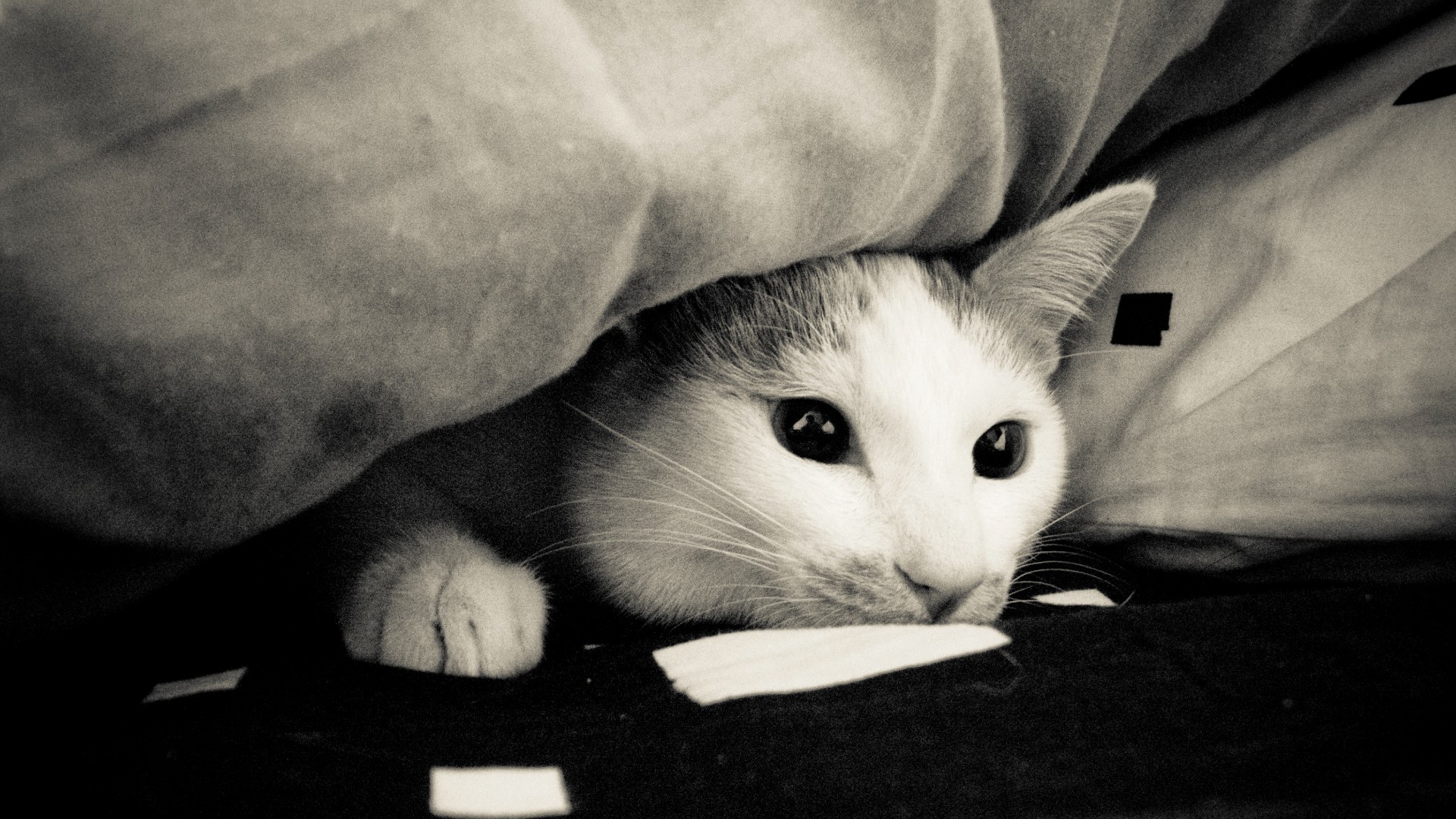How To Get Cat Out From Under Bed

At some point, many cat owners find their cat hiding under bed frames and bedding. Under your bed is apparently a very tempting place for a cat to hide! If your cat hides on a rare or intermittent basis, you can probably just ignore it and move on with your life. But if your cat spends much of their time in hiding, you may need to dig a bit deeper in your search for possible causes and solutions. Hiding can have behavioral or medical causes and identifying the cause plays a significant role in successfully managing this behavior.
- Best cat bed
- Best cat toys
- Best cat food
The answer to this question depends largely on the situation. There are certain contexts in which hiding under the bed and acting skittish could be a completely normal response. If you just recently adopted your cat, for example, and they haven't yet had time to acclimate to you and your home, hiding is an expected behavior.
Cats are sensitive to change within their environment, so even something that seems exciting to you could be hugely stressful to them. Some of the most common scenarios include home renovations, house parties, the arrival of a new baby, dog, or family member, and moving house. In stressful situations like these, your cat hiding under the bed is somewhat predictable and expected. While it may not be ideal, it's not uncommon. In most cases, situational hiding behavior should resolve when your home settles down (for example, when the houseguests leave) or after your cat has had some time to adjust to long-term changes. If your cat's behavior doesn't improve, however, it's important to seek advice from a veterinary professional.
In other situations though, you may have no clear explanation for why your cat is hiding. Perhaps there haven't been any known changes in your home environment and your cat's hiding behavior seems to have come on "out of the blue." In these situations, it's important to investigate further.
- How to keep cats from scratching furniture
- How to clean a cat bed
- How to find a lost cat
There are two major types of problems that may lead your cat to hide under the bed: behavioral issues and medical issues. Either of these types of problems can lead cats to hide from their owners.
Behavioral reasons that your cat may hide tend to relate to fear. Even if you can't think of any significant changes in your home environment, something could be triggering a fearful reaction in your cat. The trigger may be something as simple as a new piece of furniture that you recently added to your living room or new sounds that are taking place outside your home. Perhaps you've had more visitors than usual? Any change in your home environment can potentially lead your cat to spend more time in hiding.
This includes a new cat hiding under the bed, that has recently joined the family. Entering a new home is a huge change for a cat, with new people, sounds, smells, sights, and other animals to take in. So it makes sense that newly adopted cats start by taking refuge somewhere they feel safe before exploring further. You can help a new cat to settle in by providing a separate room with their own bedding and other items before slowly introducing any other cats. Feline pheromone diffusers can also help provide a calming effect.
Medical issues can also lead your cat to spend time in hiding. Anything that causes pain, lethargy, or a general feeling of illness can lead a cat to hide. Upper respiratory infections, urinary issues, gastrointestinal issues, and other medical conditions can all lead cats to spend more time in hiding than usual, in an effort to seek out quiet. If your cat's hiding is accompanied by any signs of illness, the likelihood of an underlying medical issue is significantly increased.
- Why does my cat pee on the bed?
- How to entertain indoor cats and keep them stimulated
- How to introduce a new kitten to a cat
As previously discussed, some cats will hide or seek solitude when they're feeling sick but not all. Some cats may actually become more clingy or vocal, so any changes in their behavior should be taken seriously. Especially, if they are accompanied by other signs of illness such as loss of appetite, vomiting, diarrhea, increased thirst, or changes in urination habits. So if your cat is hiding under the bed and not eating, they need to see a vet as soon as possible.
Consult your veterinarian

If your cat's hiding has a recent onset with no easily identified cause, it's best to start with a visit to your veterinarian. Your veterinarian will perform a physical exam and laboratory tests to rule out common medical conditions that can contribute to behavioral changes. Your veterinarian may recommend bloodwork, fecal parasite testing, a urinalysis, and/or other diagnostics tests, depending on the results of your cat's physical exam. A thorough medical workup will help your veterinarian determine whether there is a medical cause for your cat's change in behavior.
Your veterinarian can also help you minimize health risks that may be associated with hiding. For example, overweight cats can develop hepatic lipidosis (a serious medical condition) if they go without food for more than a few days. Your veterinarian can help you determine whether your cat is at high risk of hepatic lipidosis or other medical conditions, then recommend interventions to minimize your cat's risk while they're in hiding.
If your veterinarian suspects that your cat is hiding due to stress or anxiety, they can also make recommendations to manage your cat's fear by making changes to their home environment. In severe cases, your veterinarian may even recommend the use of anti-anxiety medication for your cat.
- Why do cats sleep so much?
- How to treat urinary tract infections in cats
- 11 things to check when your cat's not eating
Helping shy or fearful cats
Once you have ruled out medical conditions as the cause of your cat's hiding, you can begin to implement behavioral interventions to help calm their fears. Fortunately, there are a number of effective ways to reduce stress in cats.
If you can identify what is causing your cat's stress, try to remove that stressor. For example, if your cat is stressed by an outdoor cat prowling around your doors and windows, use curtains to block your cat's view or motion-activated sprinklers to discourage the outdoor visitor. If you recently added a new puppy to your home, use baby gates to create areas where your cat can safely hide from the new family member. Think about what is causing your cat stress, then work to remove the stressor or at least allow your cat to distance themselves from the stressor.
If you can't identify the source of your cat's stress, try these general stress-reduction tips:
- Ensure that your cat has easy access to necessary resources, including food, water, resting places, and a litter box. In multi-cat homes, there's often competition for these resources. Therefore, if you have multiple cats, ensure that you have at least one resting area, litter box, and feeding station per cat, plus one extra of each item. For example, a home with three cats should have four cat beds, four litter boxes, and four food/water stations. This will minimize competition between cats.
- Try Feliway Classic, a feline pheromone product that is specifically designed to exert a calming effect on cats. Using these plug-in diffusers throughout your home can help reduce your cat's overall stress level, leading to a decrease in behaviors associated with fear, such as hiding.
- Allow your cat to initiate contact and socialization with you. Some cats need a lot of human attention. If your cat falls into this category, make an effort to give love and affection when your cat requests it. If your cat is more aloof, however, don't force attention on them; this is likely to backfire and make your cat even more withdrawn. Provide affection on your cat's terms, when they request it.
- Make your cat's environment mentally stimulating. Through the use of toys, hunting feeders, and other tools, you can help your cat exercise their natural hunting tendencies in your home environment. Providing your cat with an outlet for their physical and mental energy can help decrease their overall anxiety level.
As you pay more attention to your cat's preferences and stressors, you will likely find other environmental modifications that you can make to alleviate your cat's stress. Be creative, using trial-and-error to learn which environmental changes are most beneficial for your cat.
- Dogs and cats living together: Five dos and don'ts from a vet
- Nine breeds of dogs that are good with cats
- Why you should learn how to make catnip tea for cats
One size does not fit all
When you find yourself dealing with a cat hiding under bed frames, there's no simple solution or quick fix. Instead, work with your veterinarian to determine the cause of your cat's hiding, whether that be a medical concern or a behavioral issue. Once you have ruled out medical causes for your cat's hiding, focus on making your cat's home environment as low-stress as possible.

Dr. Barnette received both her Bachelor of Science degree in zoology and her Doctor of Veterinary Medicine from the University of Florida. She's an experienced writer, educator, and veterinarian, with a passion for making scientific and medical information accessible to public and professional audiences.
How To Get Cat Out From Under Bed
Source: https://www.petsradar.com/advice/how-to-stop-a-cat-hiding-under-bed
Posted by: guanplakend.blogspot.com

0 Response to "How To Get Cat Out From Under Bed"
Post a Comment